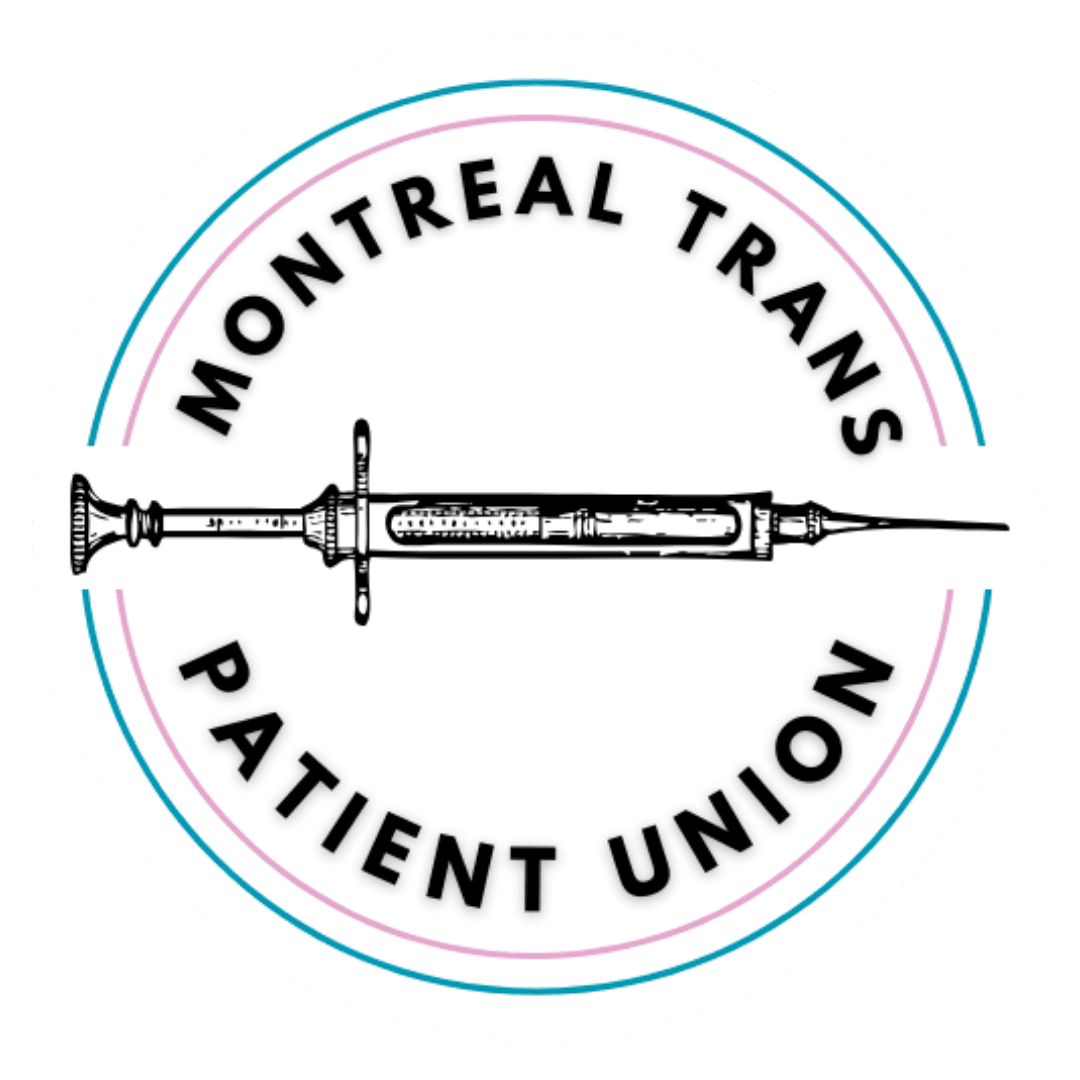Land Acknowledgement
As a predominantly settler and non-Indigenous organization, the Trans Patient Union’s existence on this land is contingent on colonial exploitation. We operate in Tio’tià:ke (also known as Montreal), the land and water of the Kanienʼkehá:ka nation. The land provides its natural abundance to nourish us as people, enabling our lives and work. The Canadian colonial regime fundamentally impedes healthy relationships with Tio’tià:ke land and waterways. This continues through Québec’s history of colonial violence against Kanienʼkehá people and exploitation of Haudenosaunee natural resources. As an organization, we are taking up the task of decolonizing our practices and rebuilding our relationship with this land and its Indigenous peoples. The Trans Patient Union stands in solidarity with the Kanien’kehá:ka Kahnistensera (Mohawk Mothers) and their on-going efforts for justice at the Royal Victoria Hospital burial site.
As an organization for gender non-conforming people, we recognize and pay respect to Two-Spirit and Indigiqueer communities in Tio’tià:ke. Two-Spirit is an umbrella term for Indigenous gender-diverse identities, coined in 1990 at the Third Annual Inter-Tribal Native American, First Nations, Gay and Lesbian American Conference in Winnipeg. As settlers, it’s important to recognize how Two-Spirit and Indigiqueer identities cannot be confined by colonial concepts of gender. The term Two-Spirit is not universal to all the Indigenous peoples of Turtle Island (colonially known as North America), as different cultures have their own traditions and practices. Similarly, Two-Spirit is not a universally-accepted term and some individuals prefer to use other terminology. In Tio’tià:ke, Onón:wat is a Kanienʼkehá:ka term that means “I have a pattern of two spirits in my body.”
As a healthcare advocacy group, we honor the traditional health practices of the Kanien’kehá:ka, whose land-based knowledge, holistic medicines and preventative care have a long history in Tio’tià:ke. Colonial exploitation and genocide have disrupted oral traditions and culture, including Kanien’kehá:ka medicine. Healthcare providers, residential schools, and colonial policing have attempted to eradicate Indigenous medicinal knowledge and care. Ultimately, the Canadian medical system routinely fails to meet the needs of Indigenous peoples in Tio’tià:ke and beyond. First Nations people are two to five times more likely to experience some form of discrimination, including, but not limited to, ethnicity, culture, race, religion, physical appearance, sexual orientation, gender, age and/or physical or mental disability . Colonization has largely disrupted Indigenous people’s means to care for themselves, resulting in poor health outcomes. This includes higher rates of chronic illness for Indigenous peoples. Roughly twice as many First Nations, Métis, and Inuit people identified as disabled than non-Indigenous people . Furthermore, on average an Indigenous person’s life is estimated to be fourteen years shorter.
Coupled with colonial efforts to enforce gender binary, Two-Spirit and Indigiqueer people face unique healthcare challenges. These may result from the intersections of transphobia, homophobia, and racism, as well as additional factors like classism or ableism. As an organization, we are keenly aware of the shortcomings of white queer spaces in addressing the needs of Two-Spirit and Indigiqueer people and are committed to remedying this disparity.
As the Trans Patient Union, we aim to improve conditions for all patients accessing gender affirming care. This goal is unattainable without a working understanding of how colonialism continues to persecute Two-Spirit and Indigiqueer people in healthcare. Currently, we do not have any Indigenous members. As of 2024, we are working to expand our interview and survey data to include more Indigenous experiences. Once we have collected this data, we will start building resources directly addressing the specific barriers faced by Two-Spirit and Indigiqueer people in navigating health. We would like to work with Indigenous organizations in building resources to support Two-Spirit, Indigiqueer, and Onón:wat people.
In closing, this land acknowledgement is a working document. Our intentions have not been to fulfill an empty gesture, but instead to initiate on-going reflection and commitment to the peoples, land, and all living things in Tio’tià:ke.
First Nations Organizations in Montreal:
Kanien’kehá:ka Kahnistensera (Mohawk Mothers)
The Kanien’kehá:ka Kahnistensera are an initiative committed to uncovering evidence of potential undiscovered evidence and unmarked graves at the site of the former Royal Victoria hospital. The Mohawk Mothers have engaged in legal action against the Royal Victoria hospital to stall future excavation until proper archaeological investigation is conducted.
Cercle Indigiqueer de Québec
The Indigiqueer Circle of Québec is an organization that advocates for the well-being and rights of 2SLGBGTQIA+ of Tio’tià:ke and across Québec Territories.
Native Women’s Shelter of Montreal
The goal of the Native Women’s Shelter is to provide a safe environment where women can begin to rebuild their lives. They offer support and frontline services to First Nations, Inuit and Métis (Indigenous) women and children to promote their empowerment and independence.
Native Friendship Centre of Montreal
For over 40 years the Native Friendship Centre of Montreal Inc. has provided continuous quality services to the urban Indigenous population of Montreal and their families. They are the only comprehensive service and referral point in the Greater Montreal Area in relation to health, social services, legal, orientation/information, education, training, and employment referral for those migrating to or through the city including those from across Québec, Canada, and the Americas.
Québec Native Women
Founded in 1974, Québec Native Women Inc. represents women from the Indigenous Peoples in Québec and Indigenous women living in urban areas. They sit at the table of the Assembly of First Nations of Québec and Labrador, on the Board of Directors of the Native Parajudicial Services of Québec as well as several other Indigenous and non-Indigenous commissions and committees.

